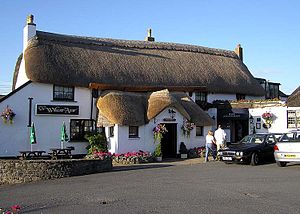A pub /pʌb/, formally public house (a house "open to the public", as opposed to a private house), is a drinking establishment fundamental to the culture of Britain, Ireland, Australia, Canada, New England, Metro Detroit, South Africa and New Zealand. In many places, especially in villages, a pub can be the focal point of the community. The writings of Samuel Pepys describe the pub as the heart of England.The history of pubs can be traced back to Roman taverns, through the Anglo-Saxon alehouse to the development of the modern tied house system in the 19th century.Historically, pubs have been socially and culturally distinct from cafés, bars, bierkellers and brewpubs. Most pubs offer a range of beers, wines, spirits, and soft drinks. Many pubs are controlled by breweries, so cask ale or keg beer may be a better value than wines and spirits. Traditionally the windows of town pubs were of smoked or frosted glass to obscure the clientele from the street but in the 1990s and after in the UK and other countries there has been a move towards clear glass, in keeping with brighter interior décors.The owner, tenant or manager (licensee) of a pub is properly known as the "pub landlord". The term publican (in historical Roman usage a public contractor or tax farmer) has come into use since Victorian times to designate the pub landlord. Known as "locals" to regulars, pubs are typically chosen for their proximity to work, the availability of a particular beer, as a place to smoke (or avoid it), hosting a darts team, having a pool table, or appealing to friends.Until the 1970s most of the larger pubs also featured an off-sales counter or attached shop for the sales of beers, wines and spirits for home consumption. In the 1970s the newly built supermarkets and high street chain stores or off-licences undercut the pub prices to such a degree that within ten years all but a handful of pubs had closed their off-sale counters, which had often been referred to colloquially as the jug and bottle.




Comment
0